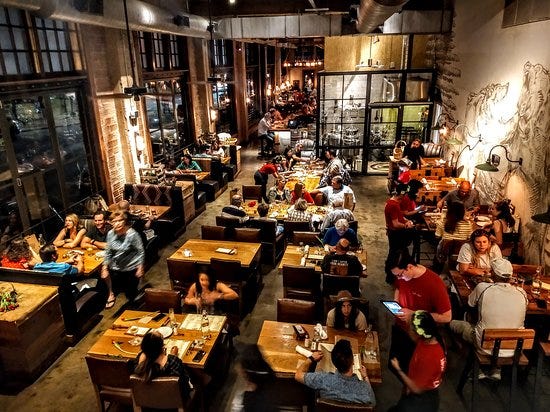Building a Sovereign Restaurant
and the increasingly predatory tech ecosystem
Not many people think about technology in the restaurant business past food delivery apps, but it is so much more than that. Ever since the pandemic, restaurants, which are predominantly low-tech, became increasingly more reliant on technology. Forced to adapt to a customer-base that is more comfortable eating at home, restaurants needed to be more accessible there through the little screens.
The issue is far more pressing than the question of high commission fees. It is the usurping of restaurants’ control over their operation. Take for example, Google’s Business Profile listings, an indispensable tool for local businesses.
Here, Google uses links to a restaurant’s menu on their profile that are sent from different providers. The restaurant has no control over this. In fact, Google advises businesses to contact the providers directly here.
I’d love to hear from others who have attempted to call the individual providers about this, because my experience has been pure frustration. Simply put, the clueless tech support who has no knowledge about any of this, instinctively responds back telling you that this is on Google and not on their platform.. and to go talk to Google about it. It’s a logical response, but not a useful one. One would have to escalate multiple times, be unusually persistent, to maybe, possibly have it removed.
At least Google is provider-agnostic, or so it seems. This is not the case with Yelp, who have an agreement with Grubhub to use their ordering widget overriding any other option.
And so it goes. Yelp says we can’t change it because it comes straight from Grubhub (divine links!). Grubhub is effectively forcing all their restaurant customers to fulfill their orders through them on Yelp.
This would have been okay if Grubhub and others earned a commission from the customer ordering food, but they are taking a sizable chunk of the restaurant’s income in return of what exactly? If the customer found their way to the business through other means (not your app), you can no longer claim to have earned it by providing a marketplace.
Strong-arming restaurants to sell through them, even outside of their own app gives some seriously major mafia vibes. What’s next? You’ll break my legs? This makes me think of flipdish, a company that makes ordering kiosks for restaurants. Flipdish will install a kiosk in the building where the restaurant is. The customer orders through it and they get a 6% commission. They think they are the good guys.
It is inconceivable to understand why anyone would want to pay 6% of their total sale, just because you put your way between the customer and the business. It’s absolutely insane! Is the kiosk a useful service? Possibly. Would I pay for it? Maybe. Would I give them a cut of my profits? Absolutely not. That’s just wrong.
There has to be a better way for the tech ecosystem to work with restaurants. This is not a sustainable situation and tech companies need to wake up before it’s too late.
The entire commission-based business model has become the default for every little startup. Months ago I came across those guys who built nifty little tool to dynamically price items to maximize revenue. Great concept with a mixed bag result. The issue is when they wanted to get paid a % of increased revenue instead of a simple flat fee for their software. This is emblematic of the entire industry.
I use this example without naming them in this negative piece despite personally liking the team and their product. I use this because those guys did not set out to take advantage of restaurants. But the commission-based model has become so pervasive that newcomers unknowingly continue to hurt the industry by adopting it.
Folks, we are due for a correction. For too long, restaurants have been unfairly taken advantage of. I suspect that we will start seeing a new breed of tools and companies that will ditch the commission-based model and charge flat fees for their services. Until then, use the delivery apps to discover new places but order directly from your favorite ones. They’ll appreciate it.




